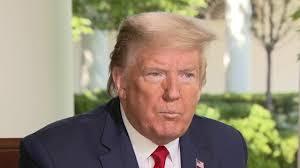A solid chunk of President Trump's latest sit-down interview with one of his favorite reporters - the OG "money honey" Maria Bartiromo - was devoted to the president's latest belligerent musings about China, the latest in an escalating tit for tat as at least one hedge fund titan subtly warns that 'World War III' between the US and China might be a tail-risk worth hedging against.
Asked about the US-China bilateral relationship, Trump replied "we could cut off the whole relationship," saying the US "could save $500 billion" by doing so. For those who don't understand the significance of this last remark, it's a reference to cancelling some of the massive pile of Treasury debt held by China. Rates have continued to drop even as China has dumped a large chunk of its US foreign-exchange holdings, which has prompted some economist know-it-alls to insist that the Fed could simply soak up the entire slug of debt held by China, dismissing the risk of a destabilizing spike in interest rates.
"There are many things we could do," Trump said, "we could cut off the whole relationship." explaining that if that happened "[US would] save USD 500bln if you cut off the whole relationship. At what point - and I said this for years...and I said it about other countries also. Nato, I was able to get them to pay hundreds of billions more. You know who is my biggest fan in the world? Secretary Stoltenberg [the head of NATO]."
After that, Trump launched into a tangent about NATO before Bartiromo managed to bring him back to the topic at hand. Moving on, she pressed Trump about whether he's raised any of these complaints with President Xi, with whom he has reportedly spoken at least one time since the beginning of the year.
Trump waved away the suggestion, saying he hasn't spoken to Xi recently and seemed to suggest he doesn't plan to. He added that China had "called" about the trade deal today and yesterday (the two sides reportedly held a virtual meeting last week). But with China, unfortunately, "you can't have an even deal"...seeming to suggest once again that the "Phase 1" trade deal is as good as dead, even as China ramps up its agriculture purchases.
Pro-Beijing tabloid the Global Times responded to the interview almost immediately, urging China to take "tougher countermeasures" against the US's recent "provcations."
"China needs to take tougher countermeasures against the US, given the latter's recent hyped up provocations, including accusing China of stealing US COVID-19 vaccine information, experts and Chinese netizens said."
Meanwhile, the paper's editor, a prominent CCP mouthpiece, hinted at the possibility of an armed conflict.
I am asked a lot recently: Will a war break out between China and the US? My answer: The two countries increasingly dislike each other, various conflicts are rising, therefore, risk for a military clash is increasing. But meanwhile, they both don't want a war. Am I right?
766 people are talking about this
Shortly after Trump's interview aired on Fox Business, former Alphabet Chairman Eric Schmidt appeared on CNBC's "Squawk Box" to rebut Trump's comments in an obvious attempt to signal to the national party that Silicon Valley still values its business relationship with the mainland, even if the political climate in the US appears to be turning.
The problem with this "decoupling" from China being pushed by the trade hawks is that once the Chinese market is closed to the US, there won't be any more cooperation.
"They're not coming back - and that hurts us. we are stronger globally when we have a common information platform when we communicate with each other...we're never going to be great friends but we can collaborate on common problems.""On business, you've had all sorts of instances of companies working together without trusting each other...why can't we do that with China? When we compete, we want to win...I strongly believe American technology can win with all the other challengers.We need to be on a footing where we get China to use these platforms not the opposite."
We understand where Schmidt is coming from. With his still-extremely-close ties to Alphabet and now-formal role in the US government, Schmidt sees China through the rose-colored glasses of Silicon Valley: It's a market where money grows on trees.
As we mentioned earlier, Trump also said he’s examining Chinese companies that trade on the NYSE and Nasdaq but don’t follow US accounting rules. "We are looking at that very strongly," he said, though he warned that taking action could backfire.
Schmidt probably winced when the president declared to Bartiromo that the "era of globalization" is over.
But as far as we can tell, there are some obvious errors in Schmidt's reasoning, most glaringly this: The Communist Party has no interest in allowing any American multinationals to take a dominant position in China, and - what's more - the party is willing to guarantee that this won't happen by adopting policies that disadvantage foreign competitors while subsidizing Chinese state-backed companies. While Beijing under Xi has made a few token gestures toward "liberalization", it's clear that the president's authoritarian bent has already moved China in the opposite direction, more aligned with the hardliners in the party who have been suspicious of the US since the 1970s, and whose suspicion, bitterness and contempt only intensified after the fall of the Soviet Union.

